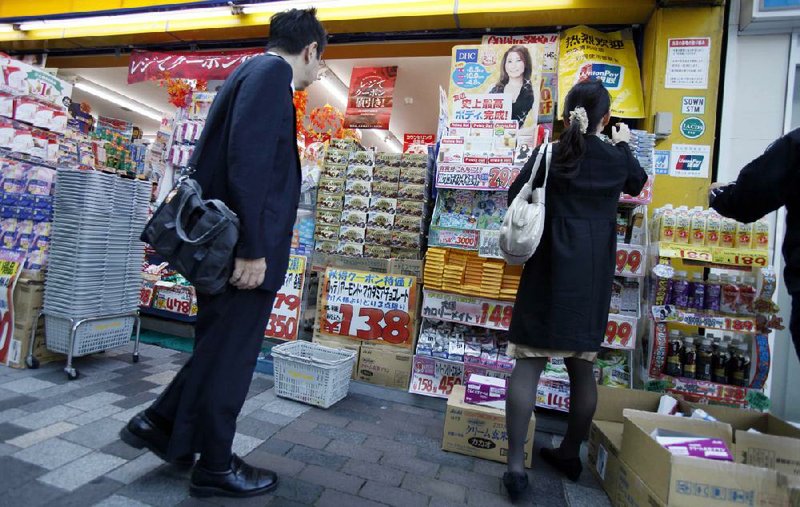TOKYO — Japan’s economy contracted in the latest quarter, signaling that, like Europe, it may already be in recession, further weighing down world growth.
On an annualized basis, the world’s No. 3 economy shrank 3.5 percent in the July-September quarter, the government reported Monday. It was in line with gloomy forecasts after Japan’s territorial dispute with China hammered exports that were already weakened by feeble global demand.
The bad news will temper optimism over recoveries in China and the U.S., where some economists are predicting growth will top 3 percent in the third quarter. China’s painful slowdown likely bottomed out in the third quarter, with recent indicators such as factory production and auto and retail sales showing improvement. And Europe, though it may have turned a corner on its debt crisis as the financial system stabilizes, is forecast to get worse before it gets better.
Japan’s outlook remains bleak, with most economists forecasting a further decline in economic activity for the October-December quarter, which would officially put it in a recession, according to the common definition of two consecutive quarters of contraction.
Consumer spending fell 0.5 percent in the third quarter, as subsidies for auto purchases expired, and corporate capital spending fell 3.2 percent. Spending on reconstruction from the country’s March 2011 tsunami and nuclear disasters has also weakened.
The drop for the current October-December quarter may not be as severe as that experienced in July-September.
“If the economy does recover in any way it will be a minute rebound,” said David Rea, an economist in London with Capital Economics. He said the contraction in gross domestic product in the last quarter of 2012 could be a couple of percentage points.
More than two decades after Japan’s asset bubble burst in the early 1990s, its policymakers have yet to devise an effective strategy to help the economy break out of its deflationary funk. Meanwhile, the Japanese yen remains stubbornly high, discouraging its companies from investing at home and undermining its export competitiveness, especially against rivals Germany and South Korea.
Strangled by weak consumer spending and public investment, the economy grew at an anemic 0.3 percent annual pace in April-June, according to figures that were revised down from the originally reported 1.4 percent.
The robust 5.2 percent pace of growth in the first quarter had raised hopes the recovery had taken hold, and until recently, the government was still forecasting growth at about 2 percent for the year. It had predicted a turnaround late in the year, but the renewed tensions with China over disputed islands in the East China Sea, coupled with sluggish growth in Europe and other key export markets, have doused hopes for a significant rebound before 2013.
A recent slew of dismal data releases offers little encouragement.
Squeezed by surging costs for imported fuel and sinking exports, Japan’s current account surplus plunged to $34 billion in April-September, its lowest level since monthly data began in 1985, as the trade deficit surged.
Although Japan will likely continue to run current account surpluses for some time to come, its decline is a stark reminder of the country’s reliance on exports to support its energy-intensive standard of living through imports of food, fuel and other resources.
Adding to the squeeze on pocketbooks from increases in electricity rates, winter bonuses for employees are falling by an average of 4 percent this year.
Machinery orders for September fell twice as fast as expected. Meanwhile, the job market softened, likely hurting prospects for stronger consumer spending to help offset weak exports. Slower-than-anticipated government spending on reconstruction has further undermined demand.
Signs of a recovery in China’s growth rate offer the tantalizing hope of stronger demand for Japan’s exports - if only territorial tensions are kept in check.
Tokyo’s first policy priority should be to defuse the antagonisms with Beijing that sparked sometimes violent protests in China during September, and are fueling a backlash against Japan and Japanese products, especially cars, Baader said.
“I don’t think this can be done overnight and I don’t think Chinese consumers are going to suddenly rediscover their love of Japanese products,” he said. But eventually, “whether it’s three or six months, people will forget. And Japanese products are of course highly desirable.”
Business, Pages 21 on 11/13/2012

